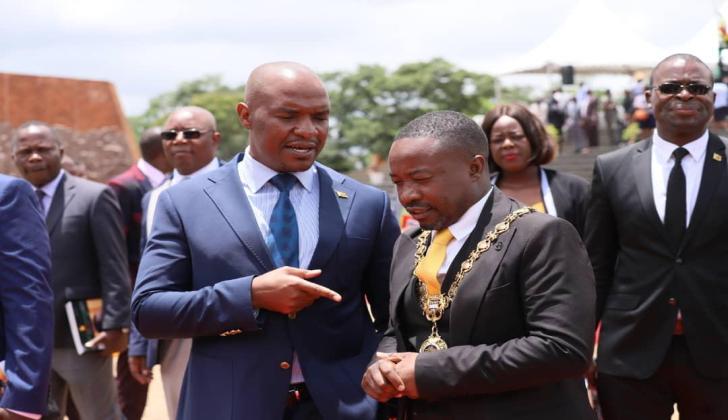News / National
Harare pumping capacity down to 25%
19 Sep 2024 at 06:34hrs |
0 Views

Ongoing disputes among officials at the Harare City Council are crippling efforts to address the capital's worsening water crisis, with revelations that the city is producing only a quarter of its daily water requirements. The discord centers on a controversial 2020 deal with South Africa-based Nanotech Water Solutions, aimed at improving water treatment at the city's main plants.
The deal with Nanotech, which covers the supply, installation, and operation of Chlorine Dioxide Water Treatment Technology at the Morton Jaffray Waterworks, has been a source of conflict between councillors and city management. Councillors are pushing for the termination of the contract, alleging breaches of multiple laws, including Exchange Control Regulations, the Public Procurement and Disposal of Public Assets Act, and the Urban Councils Act.
The council has also recommended referring the matter to the Zimbabwe Anti-Corruption Commission (Zacc), citing potential criminal charges against officials involved in the deal. Allegations of corruption have also surfaced, with suggestions that some officials sought kickbacks from the US$5.4 million contract.
The city's water production crisis has worsened, with Harare's water treatment plants, Morton Jaffray and Prince Edward, producing just 300 megalitres per day, far below the required 1,200 megalitres. Last month, the city was forced to decommission the Prince Edward Water Treatment Plant after its water sources, Harava and Seke dams, dried up. Acting Harare Water director Richard Nyadini described the situation as dire.
"As of yesterday, we were supplying 300 megalitres from the plants. There is a 900 megalitre shortage for Harare," Nyadini said. "We are working with Nanotech to see how best we can reduce or eliminate chemicals. Currently, we are only using aluminium sulphate, sodium chloride, and chlorine gas."
Nanotech, however, is accused of breaching its contract by failing to provide acquittals for the US$1.1 million paid in advance. Harare officials allege the company did not act in good faith, acquitting only US$189,000 of the sum received.
Nanotech disputes these claims, with the company's manager Joe Rugwete asserting that council officials frustrated the project due to demands for kickbacks. Despite the setbacks, Rugwete said Nanotech remains committed to resolving Harare's water challenges.
"We are prepared to make sure that clean water is provided to the residents, but we also implore the council to meet its obligations," Rugwete said. He added that Nanotech would cooperate with Zacc and expects a commission of inquiry appointed by President Emmerson Mnangagwa to help resolve the matter.
Meanwhile, internal council committees continue to wrestle over the future of the Nanotech contract. An environmental management committee meeting in July raised concerns about delays caused by the dispute, but recommendations to have the city's business development unit take over the project were rejected. The matter has since been referred to the council's audit committee, which acknowledged the ongoing impasse in a report issued in August.
As Harare's water crisis deepens, residents continue to suffer from erratic water supplies, with little sign of a resolution in sight.
The deal with Nanotech, which covers the supply, installation, and operation of Chlorine Dioxide Water Treatment Technology at the Morton Jaffray Waterworks, has been a source of conflict between councillors and city management. Councillors are pushing for the termination of the contract, alleging breaches of multiple laws, including Exchange Control Regulations, the Public Procurement and Disposal of Public Assets Act, and the Urban Councils Act.
The council has also recommended referring the matter to the Zimbabwe Anti-Corruption Commission (Zacc), citing potential criminal charges against officials involved in the deal. Allegations of corruption have also surfaced, with suggestions that some officials sought kickbacks from the US$5.4 million contract.
The city's water production crisis has worsened, with Harare's water treatment plants, Morton Jaffray and Prince Edward, producing just 300 megalitres per day, far below the required 1,200 megalitres. Last month, the city was forced to decommission the Prince Edward Water Treatment Plant after its water sources, Harava and Seke dams, dried up. Acting Harare Water director Richard Nyadini described the situation as dire.
"As of yesterday, we were supplying 300 megalitres from the plants. There is a 900 megalitre shortage for Harare," Nyadini said. "We are working with Nanotech to see how best we can reduce or eliminate chemicals. Currently, we are only using aluminium sulphate, sodium chloride, and chlorine gas."
Nanotech disputes these claims, with the company's manager Joe Rugwete asserting that council officials frustrated the project due to demands for kickbacks. Despite the setbacks, Rugwete said Nanotech remains committed to resolving Harare's water challenges.
"We are prepared to make sure that clean water is provided to the residents, but we also implore the council to meet its obligations," Rugwete said. He added that Nanotech would cooperate with Zacc and expects a commission of inquiry appointed by President Emmerson Mnangagwa to help resolve the matter.
Meanwhile, internal council committees continue to wrestle over the future of the Nanotech contract. An environmental management committee meeting in July raised concerns about delays caused by the dispute, but recommendations to have the city's business development unit take over the project were rejected. The matter has since been referred to the council's audit committee, which acknowledged the ongoing impasse in a report issued in August.
As Harare's water crisis deepens, residents continue to suffer from erratic water supplies, with little sign of a resolution in sight.
Source - newsday
Join the discussion
Loading comments…


































